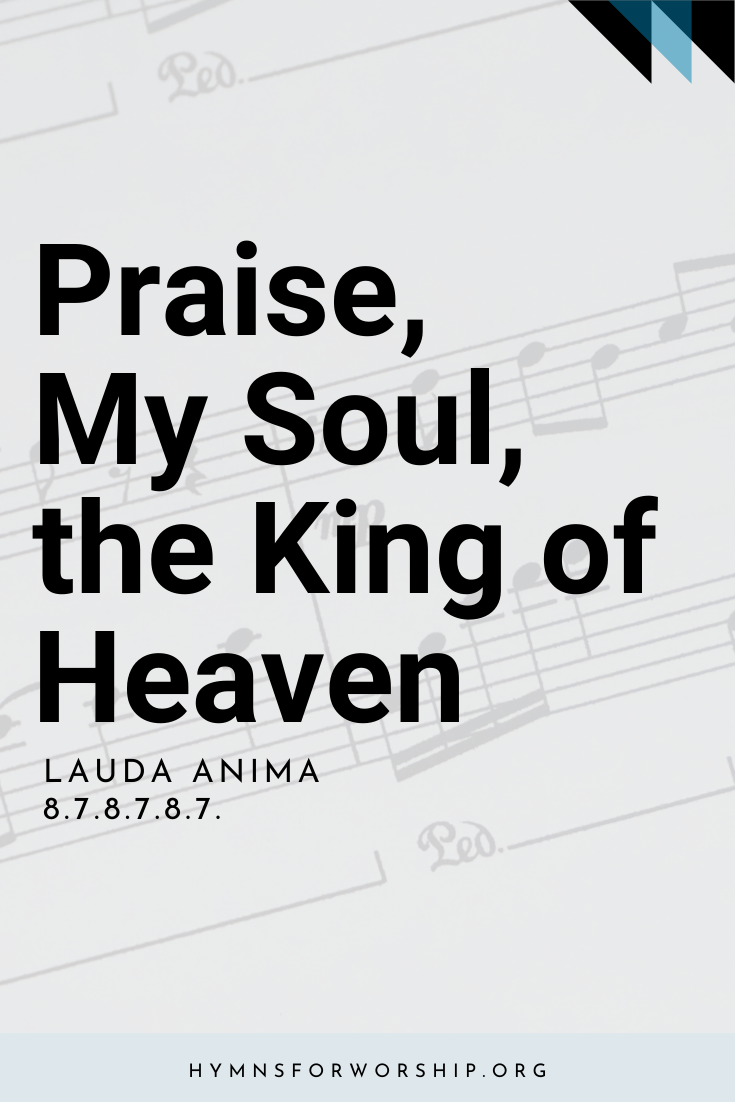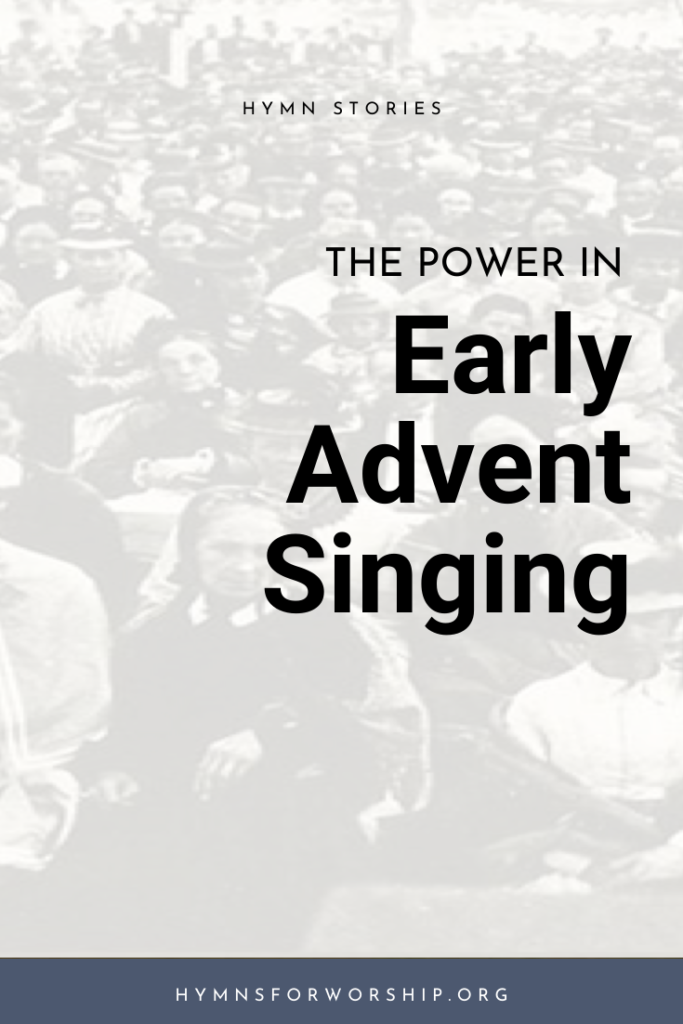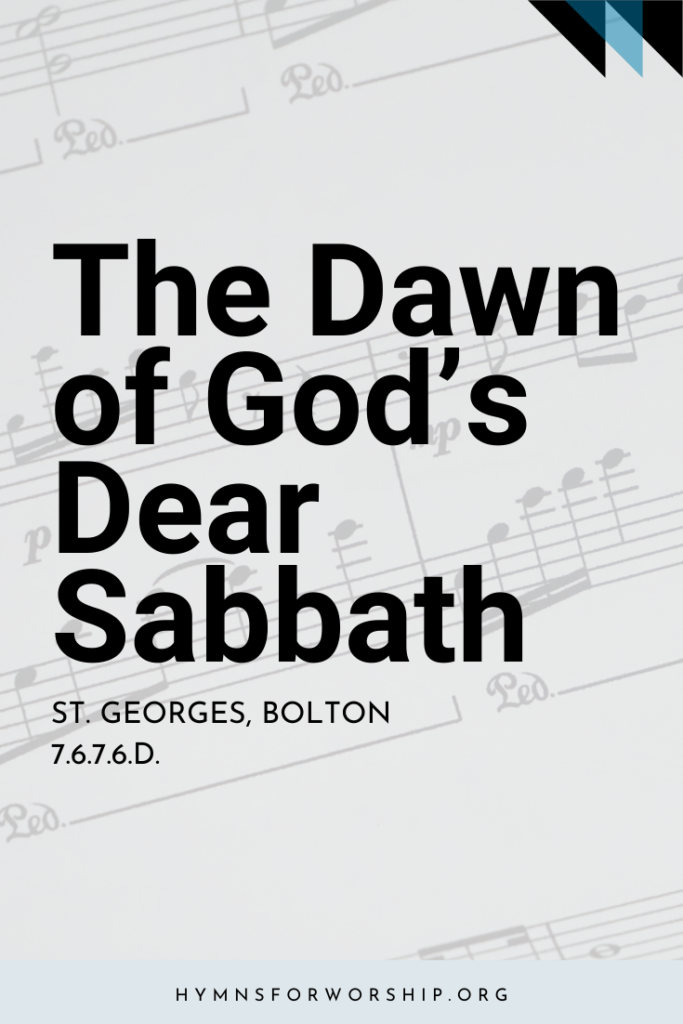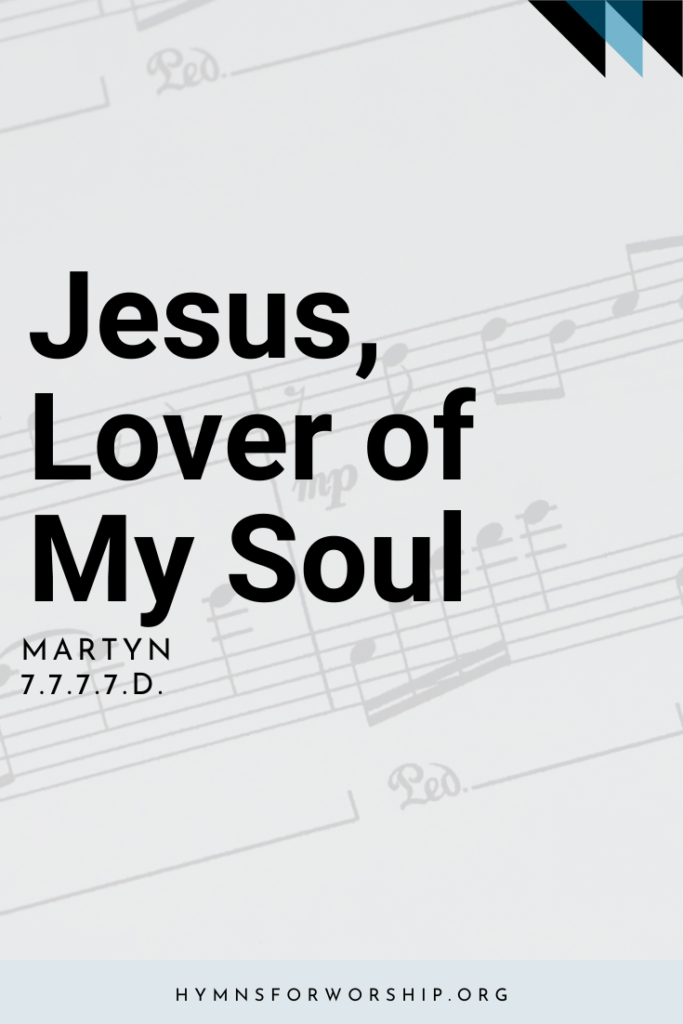WORSHIP >> Adoration & Praise
SDAH 4
Praise, my soul, the King of heaven;
To his feet thy tribute bring;
Ransomed, healed, restored, forgiven,
Who like thee His praise should sing?
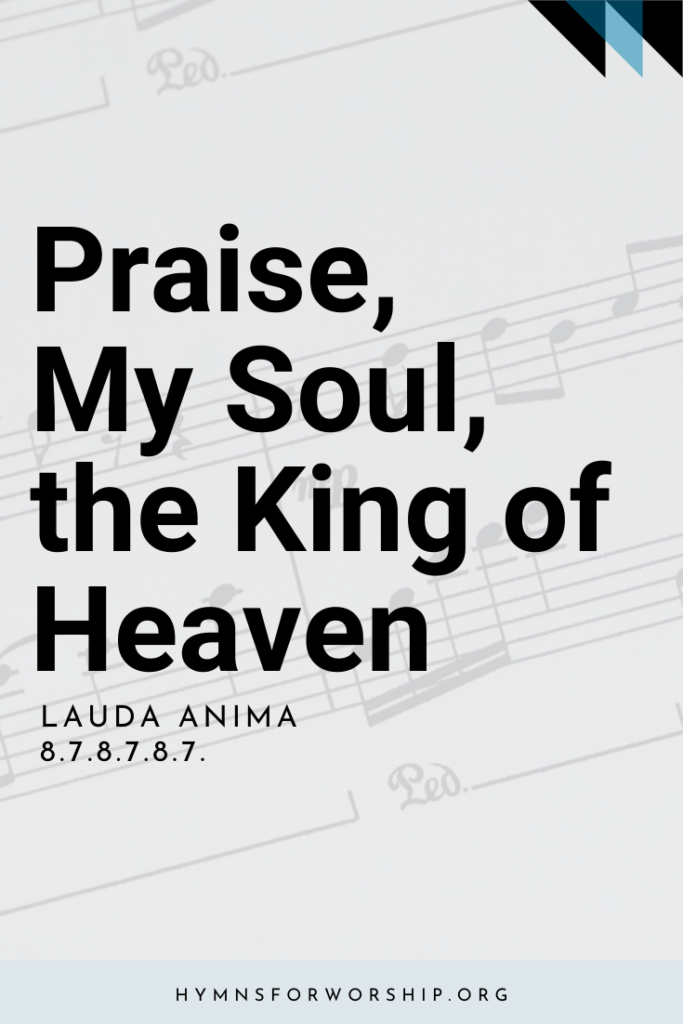

Text
1
Praise, my soul, the King of heaven;
To his feet thy tribute bring;
Ransomed, healed, restored, forgiven,
Who like thee His praise should sing?
Praise Him, praise Him, alleluia!
Praise the everlasting King.
2
Praise him for his grace and favor
To our fathers in distress;
Praise him still the same forever,
Slow to chide and swift to bless:
Praise Him, praise Him, alleluia!
Glorious in His faithfulness.
3
Tenderly He shields and spares us;
Well our feeble frame he knows;
In his hands He gently bears us,
Rescues us from all our foes.
Praise Him, praise Him, alleluia!
Widely yet his mercy flows.
4
Angels, help us to adore him;
Ye behold him face to face;
Sun and moon, bow down before him,
Dwellers all in time and space.
Praise Him, praise Him, alleluia!
Praise with us the God of grace.

Hymn Info
Biblical Reference
Ps 103 (a) Ps 136:26 (b) Ps 103:9 (c) Ps 103:14 (d) Ps 103:20; 148:3
Author
Henry Francis Lyte (1793-1847)
Performance Suggestions
This hymn has three settings. The second setting (4-part) may be used for all stanzas. First setting in unison.
Hymn Tune
LAUDA ANIMA
Metrical Number
8.7.8.7.8.7.
Composer
John Goss (1800-1880)
Alternate Tune
REGENT SQUARE, SDAH 119
Theme
ADORATION & PRAISE
Hymn Score
Piano Accompaniment
Notes
Get to know the hymns a little deeper with the SDA Hymnal Companion. Use our song leader’s notes to engage your congregation in singing with understanding. Even better, explore this hymn in other languages.
This is a very free paraphrase of Psalm 103, first printed in a collection of 280 psalms Lyte made for his own congregation at Lower Brixham, Devonshire, in 1834, The Spirit of the Psalms. Where the psalm uses “Bless the Lord, O my soul,” Lyte changes it to the more exuberant “Praise, my soul, the King of Heaven.” The stanza omitted is:
Frail as summer’s flower we flourish,
Blows the wind and it is gone;
But while mortals rise and perish,
God endures, unchanging on.
Praise Him, praise Him, Alleluia.
Praise the high eternal One.
In an era when many were insisting that versions of the psalms should be as close as the original wording as possible, the title of his book shows that he was breathing new life into these ancient songs, using his own words while preserving the “spirit.”
Henry Francis Lyte was born June 1, 1793, at Ednam, Scotland; he was raised as an orphan and became a scholar at Trinity College, Dublin. For a time he considered studying medicine, but changed to theology. After graduation he served several parishes in Ireland and England, including Marazion in Cornwall, where he underwent a great spiritual change.
In 1823 he became pastor at a little fishing village, Lower Brixham, in Devonshire, England, where he stayed 24 years until his death in 1847. When King William the Fourth visited Brixham, he was so delighted with the reception accorded him at the church that he gave the house at Berry Head, overlooking Torbay, to Lyte as his residence. Here is where most of his hymns were written, many taken collections of his poetry. Julian lists 81 hymns that came from his Poems Chiefly Religious, 1833 and 1845. He gave himself wholeheartedly to these rough people of the sea. At one time he had nearly 800 children in the Sunday scholl, with some 70 teachers. Under a busy program his health broke down, and in spite of going to the Riviera to recover from tuberculosis, he died at Nice November 20, 2847, at the age of 54. He published Poems Chiefly Religious, 1833, enlarged in 1845, and Spirit of the Psalms, 1834, enlarged in 1836.
Other hymns by Lyte in SDAH are: No. 25, “Praise the Lord, His Glories Show”; No. 50, “Abide With Me”; and No. 325, “Jesus, I My Cross Have Taken.”
LAUDA ANIMA, the Latin for PRAISE, MY SOUL, another name by which this tune in known, first appeared in R. Brown Borthwick’s Supplemental Hymn and Tune Book, 1869. It was set to this text, in unison with organ accompaniment, and for four-part a cappella singing. SDAH uses three of the four setting found in Hymns Ancient and Modern, Revised, 1950, changing the note values from half and whole notes to quarter and half notes.
Erik Routley, in his Music of Christian Hymns, 1981, calls this tune a “masterpiece of simplicity and effectiveness, the only Goss tune that has remained in currency… that will last as long as hymnody lasts.” It was chosen as the opening processional hymn at the wedding of Princess (now Queen) Elizabeth to Prince Philip in 1947. She was following the tradition set by her mother, who also used this hymn when she married King George VI in 1923.
The tune noteworthy for the last score of melody, which is based on the descending scale, and for the harmony of the second score of the second setting, where the bass part ascends in an almost complete chromatic scale.
Sir John Goss was born December 27, 2800, at Fareham, England. His father was an organist, and he took naturally to music, becoming at age 11 a shoir singer at the Chapel Royal in London. For a time he considered going into opera singing but decided for organ, serving in two churches before succeeding Thomas Atwood in1838 at St. Paul’s Cathedral, London. Here he built a reputation of distinction over 34 years, directing, playing,a nd composing. For 47 years, in 1827 to 1874, he taught harmony at the Royal Academy of Music. Queen Victoria knighted him in 1872, and Cambridge University conferred on him the D.Mus. in 1876. He wrote some 50 anthems and services, many hymn tunes, and a textbook on harmony. He was musical editor of an influential hymnbook, The Church Psalter and Hymn Book, 1856. Some British hymnologists as second only to Samuel S. Wesley among ninteenth-century church musicians. He died at Brixton, London, on May 10, 1880, and was buried in St. Paul’s Cathedral, London.

